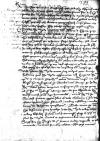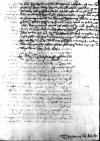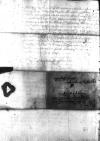XXVII praeteriti mensis redditae fuerunt per dominum ⌊Casparem⌋ Reverendissimae Paternitatis Vestrae nepotem, ⌊⌋ ⌊Heilsperg⌋ 1539-04-21⌊21 Aprilis1539-04-21⌋ scriptae, quibus certior factus ⌊⌋ meas 23 Novembris datas perlatas tandem fuisse. Quaenam tam diuturnae morae perferendi causa fuerit, non satis mirari possum, cum tamen ⌊⌋ per postam miserim.
Commendat Reverendissima Paternitas Vestra hisce suis ⌊⌋ praefatum dominum ⌊Casparem⌋, quem revera commendatum adeo habebo, ac si meus frater esset germanus. ⌊Hic⌋ aliquantulum valetudinarius ad ⌊urbem⌋ pervenit, contraxerat enim ex intenso aestu et itineris fatiga febriculam, sed - laus Deo - iam plane restitutus. Curabo, ut aliquem congruum sibi in aliquo rotae officio scribendi officiumque discendi habeat locum. Attamen satis incongruo pervenit ad ⌊urbem⌋ tempore, cogitur enim per hosce proxime futuros tres menses, quibus feriae sunt, feriari. Sed tamen ordinem dabo, ne omnino otietur. Accedit etiam aliud malum et inconveniens, quod omnium rerum est magna in ⌊urbe⌋ caritas. Sed postquam hic praesens est, boni ut cosulamus omnia, necesse est.
Velit praeterea Reverendissima Paternitas Vestra certior fieri, numquid XXX ducatos habuerim, quos Reverendissima Paternitas Vestra assignaverat etc. Comperiet Reverendissima Paternitas Vestra in computu expeditionis ⌊ecclesiae Warmiensis⌋ misso me habuisse hic a ⌊Fuggaris⌋ pro laboribus meis ducatos 30. Itidem ⌊reverendissimus dominus Culmensis⌋ comperiet in computu suo me ex parte dominationis suae reverendissimae habuisse ducatos XX. De qua liberalitate reverendissimo[rum] dominorum meorum gratias ago immortales.
Litteras reverendissimi ⌊cardinalis Sanctorum Quattuor⌋ propter illius ab ⌊urbe⌋ absentiam (ivit, ut fertur, ⌊Pistorium⌋ prope ⌊Florentiam⌋) nondum reddidimus. Curabo tamen, ut diligenter praesententur.
Doleo revera ex animo super differentiam, quam, intelligo, inter Reverendissimam Paternitatem Vestram et dominum ⌊Alexandrum Schulteti⌋ confratrem meum intervenisse, quodque is piis et sanis Reverendissimae Paternitatis Vestrae monitis et exhortationibus non acquiescit. Scripsi iam super praemissis ⌊dominationi suae⌋, fraterne eundem rogando et admonendo, ne contra stimulum calcitret, sed piis monitis et sanis Reverendissimae Paternitatis Vestrae consiliis obtemperet et auscultet. Quod ⌊eum⌋ omnino facturum spero. Neque Reverendissima Paternitas Vestra sibi, obsecro, persuadeat, quod ego is velim esse, qui ⌊illius⌋ sine etiam cuiusvis alterius causae patrocin... contra et adversus Reverendissimam Paternitatem Vestram suscipere velim. Quicquid autem consul[en]do fraterneque monendo, ut controversiae differentiaeque concordia et pace sopiantur, efficere possum, in hoc omnem meam operam et studium collocabo.
Rerum novarum penes nos nihil, nisi quod aiunt ⌊caesarem⌋ in futuro autumno ⌊Germaniam Inferiorem⌋ versus profecturum. Deus fax[it], salvis avibus, quo ⌊sua maiestas⌋ insolentiam nonnullorum compescere, qui nihil nobis, nisi exitium et interitum minantur, sua praesentia valea[t].
Et me Reverendissimae Paternitati Vestrae, domino meo gratiosissimo, maiorem in modum commendo. Quem diutissime fauste feliciterque valere cupio ex animo.


